Venezuelan Jewish converts Franklin Perez and his wife Sahir Quitero, son Ezra and daughter Hannah walk inside an absorption center in the southern city of Beersheba, Israel, Thursday, March 23, 2017. For a group of nine struggling Venezuelan converts to Judaism their torturous journey to a better life in the promised land finally brought them to Israel on Thursday. They immigrated under the Law of Return, which gives Jews the world over the right to settle in Israel, Israel, Thursday, March 23, 2017. (AP Photo/Tsafrir Abayov)
The Associated Press
JERUSALEM (AP) - It's not quite Moses' 40 years in the desert, but for nine struggling Venezuelan converts to Judaism, their tortuous journey to a better life in the promised land finally brought them to Israel on Thursday.
They paused inside the arrivals hall of Israel's international airport for a prayer before being whisked into a minibus and taken to an immigration absorption center - a tidy, low-slung building with simple beds - in an Israeli desert city.
Israel's Law of Return gives Jews the world over the right to settle in the Jewish state. But the Venezuelan converts were denied entry late last year over concerns they weren't involved enough with Venezuela's Jewish community and were looking to take advantage of Israel's immigration policies to flee the troubled South American nation.
Israeli authorities reversed that decision in January, citing the humanitarian crisis in Venezuela. As part of a face-saving deal between Israel's Interior Ministry, headed by an ultra-Orthodox Jewish minister, and the liberal Jewish movement to which the nine belonged, the converts were made to undergo a repeat conversion and join an "established religious community" for several months in Israel before being eligible for citizenship.
The group marked its conversion - for the second time - with a ritual immersion last Sunday at a synagogue in Colombia before setting off for Israel.
The protracted fight over the "Venezuelan Nine" underscores the fierce debate in Israel over who is a Jew and how a religion that doesn't proselytize grapples with an increasing number of converts, especially from Latin America, who have found their way to Judaism outside traditional paths like marrying someone of the faith.
It's also taken its toll on the nine Venezuelans.
For years, Franklin Perez has lived a Jewish life. He wears a skullcap, gave Hebrew names to his children and traveled three hours by road to Caracas to buy kosher meat - when he could find it.
His embrace of Judaism began when he moved to the Venezuelan city of Maracay in 2004 after losing his job as a philosophy professor during a political shake-up at his university. He fell in with a group of messianic Jews who combine Christianity with Jewish traditions. Perez's curiosity had already been piqued during his childhood by a Jewish great-grandmother in an otherwise Roman Catholic family, and he led the group in study of religious texts.
Over time, a hardcore nucleus was drawn to bedrock Judaism. In 2011 they found Juan Mejia, a Conservative movement rabbi who lives in Oklahoma but returns a few times a year to his native Colombia. He led them in six hours of study online each week, and after a year they traveled to study with him for a week in Santa Marta, Colombia. They returned in 2014, and under the supervision of a religious court of three rabbis took a dip in the warm waters of the Caribbean to complete their conversion.
"This is not a new thing, this is not a fad," Mejia said. "These people didn't decide yesterday, 'Oh, Venezuela is going down the drain, let's find someplace to go.'"
Leaders of the cloistered Jewish community in Caracas were doubtful of their motives because they had never had contact with the group, even though the nine had been quietly welcomed by a dying community of Orthodox Jews in the nearby city of Valencia, which needed them for the 10-male quorum required for public worship in a synagogue.
According to an official in Israel familiar with the case, there was evidence suggesting some of the applicants converted to Judaism to take advantage of Israeli social benefits, including health insurance. The official spoke on condition of anonymity because he was not authorized to discuss the converts' personal status.
But after a stormy parliamentary committee hearing in Israel, immigration officials said the nine could come.
Perez freely admits that if it weren't for Venezuela's collapse they would have never looked to leave. He is resettling his family in a foreign country with just $350 and seven suitcases of belongings - all that's left after Venezuela's economic slide, which brought triple-digit inflation and widespread shortages of food and medicine.
Another member of the group, Nadine Garcia, couldn't find chemotherapy drugs for her cancer treatment. And the home of Perez's in-laws, where his family had been living, was recently broken into by thieves who walked off with cheese and rice.
The Jewish Agency, a nonprofit organization that works with the Israeli government on immigration, paid for their flights and housing. They'll temporarily live in the immigration absorption center while they perfect their Hebrew.
"I don't imagine ever going back, not even to visit," said Perez. "The problem isn't economic. It's social, moral and ethical. For Venezuelans to rebuild their lost values it's going to take at least 50 years."
Members of Venezuela's aging Jewish community have been fleeing to places like Miami and Panama for years. From a peak of 20,000 Jews in Venezuela two decades ago, around 8,000 remain today.
In addition to the economic woes, many Jews say they have faced anti-Semitism since the late President Hugo Chavez broke off diplomatic relations with Israel in 2009.
Mejia said he thinks the wariness of Israeli authorities over the nine stemmed from discomfort with the idea that in the age of the internet and spiritual shopping many people are being drawn to one of the world's oldest living faiths.
"We're not used to this amount of popularity," quipped Mejia, who embarked on his own path to Jewish conversion while studying philosophy in Colombia.
But he said ultimately it is Israel's mission as a Jewish state to provide refuge for Jews in danger - including converts.
"I cannot save everyone, but these are my students and I'm very relieved that so many people have come together to do a little bit," Mejia said.
___
Goodman reported from Bogota, Colombia.
Venezuelan Jewish converts Franklin Perez and his wife Sahir Quitero, son Ezra and daughter Hannah settle in their new home in an absorption center in the southern city of Beersheba, Israel, Thursday, March 23, 2017. For a group of nine struggling Venezuelan converts to Judaism their torturous journey to a better life in the promised land finally brought them to Israel on Thursday. They immigrated under the Law of Return, which gives Jews the world over the right to settle in Israel, Israel, Thursday, March 23, 2017. (AP Photo/Tsafrir Abayov)
The Associated Press
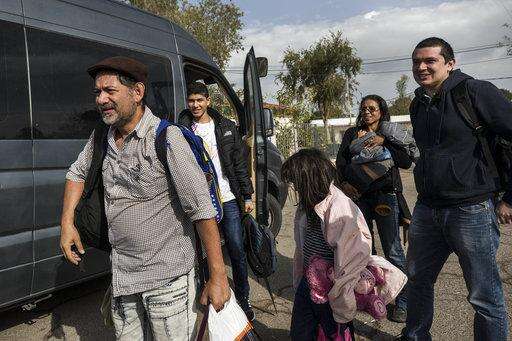
Perez family, Venezuelan Jewish converts, arrive to an absorption center in the southern city of Beersheba, Israel, Thursday, March 23, 2017. For a group of nine struggling Venezuelan converts to Judaism their torturous journey to a better life in the promised land finally brought them to Israel on Thursday. They immigrated under the Law of Return, which gives Jews the world over the right to settle in Israel, Israel, Thursday, March 23, 2017. (AP Photo/Tsafrir Abayov)
The Associated Press
Perez family, Venezuelan Jewish converts, arrive to an absorption center in the southern city of Beersheba, Israel, Thursday, March 23, 2017. For a group of nine struggling Venezuelan converts to Judaism their torturous journey to a better life in the promised land finally brought them to Israel on Thursday. They immigrated under the Law of Return, which gives Jews the world over the right to settle in Israel, Israel, Thursday, March 23, 2017. (AP Photo/Tsafrir Abayov)
The Associated Press
Venezuelan Jewish converts arrive at an airport in Tel Aviv, Israel, Thursday, March 23, 2017. For a group of nine struggling Venezuelan converts to Judaism their torturous journey to a better life in the promised land finally brought them to Israel on Thursday. They immigrated under the Law of Return, which gives Jews the world over the right to settle in Israel. (AP Photo/Sebastian Scheiner)
The Associated Press
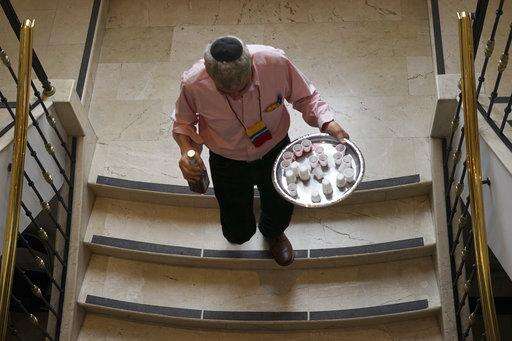
In this March 19, 2017 photo, a rabbi carrying cups for kosher wine walks down the steps at a synagogue in Bogota, Colombia. On a recent Sunday, a toast was made for nine Venezuelan converts who have had a torturous journey trying to reach Israel. The group marked their conversion--for the second time in as many years, with a ritual immersion as part of a save-face deal brokered by liberal Israeli lawmakers and rabbinic authorities who had initially rejected their request to migrate on the grounds they couldn't demonstrate their commitment to Judaism. (AP Photo/Christine Armario)
The Associated Press
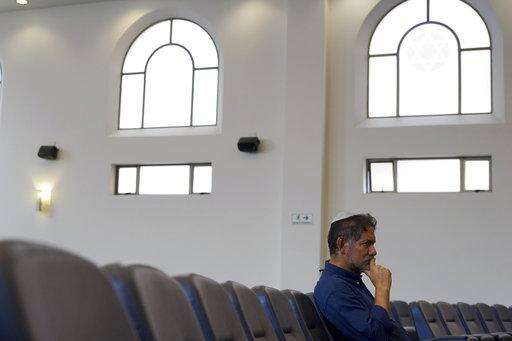
In this March 19, 2017 photo, Franklin Perez, listens to a rabbi at a synagogue in Bogota, Colombia. Perez is among nine Venezuelan converts who have had a torturous journey trying to reach Israel. Franklin Perez has lived a Jewish life: he wears a skullcap, gave Hebrew names to his children and even travels three hours by road to Caracas to buy Kosher meat, when he can find it among Venezuelaâs crippling food shortages. (AP Photo/Christine Armario)
The Associated Press
In this March 19, 2017 photo, Jackson Marrone receives a special blessing at a synagogue in Bogota, Colombia. Marrone is among nine Venezuelan converts who have had a torturous journey trying to reach Israel. According to an official in Israel familiar with the case, there was evidence suggesting some of the applicants converted to Judaism to take advantage of Israeli social benefits, including health insurance. (AP Photo/Christine Armario)
The Associated Press
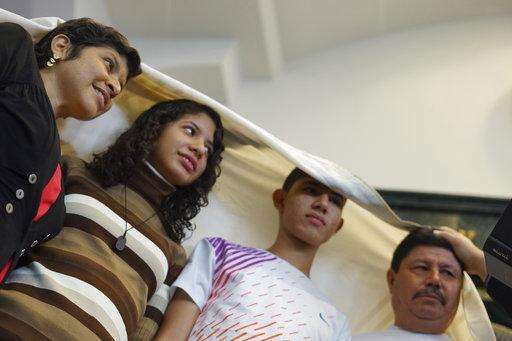
In this March 19, 2017 photo, the Garcia family receives a special blessing in Bogota, Colombia. The Garcia's are among a group of Venezuelan converts who have had a torturous journey trying to reach Israel. Their journey almost fell apart when late last year, after months of correspondence with officials in Israel, they were denied entry over concerns they werenât involved enough with Venezuelaâs Jewish community and were looking to take advantage of Israelâs immigration policies to flee the troubled South American nation. (AP Photo/Christine Armario)
The Associated Press
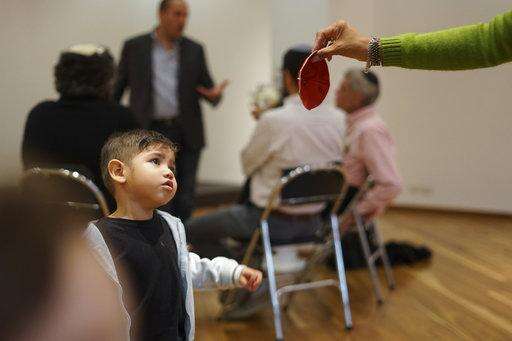
In this March 19, 2017 photo, Ezra Perez, 3, is handed a kippah at a synagogue in Bogota, Colombia. Ezra is among a group of Venezuelan Jewish converts who have had a torturous journey trying to reach Israel. The protracted fight over the so-called âVenezuela Nineâ underscores the fierce debate in a divided Israeli society over who is a Jew and how a religion that doesnât proselytize like Christianity or Islam embraces an increasing number of converts, especially from Latin America, who have found their way to Judaism outside traditional paths like marrying someone of the faith. (AP Photo/Christine Armario)
The Associated Press
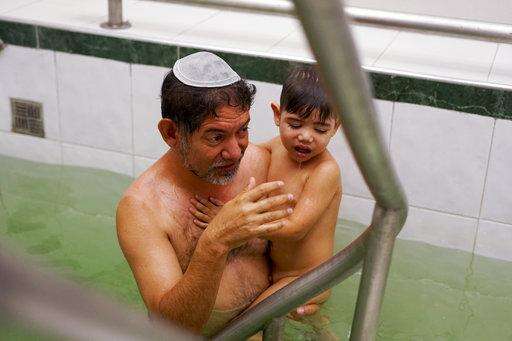
In this March 19, 2017 photo, Franklin Perez dips his son in a special bath to mark their conversion to Judaism in Bogota, Colombia. Franklin Perez and his son are among nine Venezuelan converts who have had a torturous journey trying to reach Israel. The group marked their conversion--for the second time in as many years--with a ritual immersion as part of a save-face deal brokered by liberal Israeli lawmakers and rabbinic authorities who had initially rejected their request to migrate on the grounds they couldn't demonstrate their commitment to Judaism. (AP Photo/Christine Armario)
The Associated Press

In this March 19, 2017 photo, a rabbi fills out paperwork in Bogota, Colombia, making the conversion of nine Venezuelans to Judaism official before their departure to Israel. According to an official in Israel familiar with the case, there was evidence suggesting some of the applicants converted to Judaism to take advantage of Israeli social benefits, including health insurance. (AP Photo/Christine Armario)
The Associated Press
In this March 17, 2017 photo, Franklin Perez speaks with his son Ezra as they wait for a flight to Bogota on their way to Israel, at the Simon Bolivar International Airport in Maiquetia, Venezuela. Perez freely admits that if it werenât for Venezuelaâs collapse they wouldâve never looked to move to Israel. (AP Photo/Fernando Llano)
The Associated Press
In this March 17, 2017 photo, Hannah Perez daughter of Franklin Perez rests on the floor as she waits along with her family for a flight to Bogota on her way to Israel, at the Simon Bolivar International airport in Maiquetia, Venezuela. For years, Franklin Perez has lived a Jewish life: he wears a skullcap, gave Hebrew names to his children and even travels three hours by road to Caracas to buy Kosher meat, when he can find it among Venezuelaâs crippling food shortages. (AP Photo/Fernando Llano)
The Associated Press
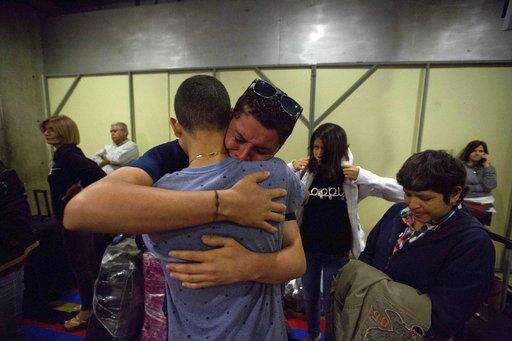
In this March 17, 2017 photo, Jose Luis Garcia embraces and cries as he says goodbye to his little brother that departs to Bogota on his way to Israel, at the Simon Bolivar International Airport in Maiquetia, Venezuela. The protracted fight over the so-called âVenezuela Nineâ religious converts on their way to Israel underscores the fierce debate in a divided Israeli society over who is a Jew and how a religion that doesnât proselytize like Christianity or Islam embraces an increasing number of converts, especially from Latin America, who have found their way to Judaism outside traditional paths like marrying someone of the faith. (AP Photo/Fernando Llano)
The Associated Press
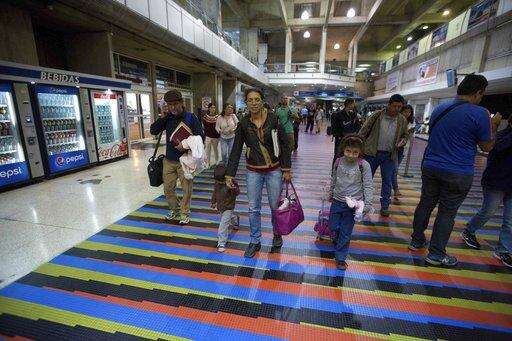
In this March 17, 2017 photo, Jewish converts Sahir Quitero, center, her husband Franklin Perez, son Ezra, left, and daughter Hannah, walk to departures lounge of the Simon Bolivar International Airport in Maiquetia, Venezuela, on their way to Israel. Their journey almost fell apart when late last year, after months of correspondence with officials in Israel, they were denied entry over concerns they werenât involved enough with Venezuelaâs Jewish community and were looking to take advantage of Israelâs immigration policies to flee the troubled South American nation. (AP Photo/Fernando Llano)
The Associated Press